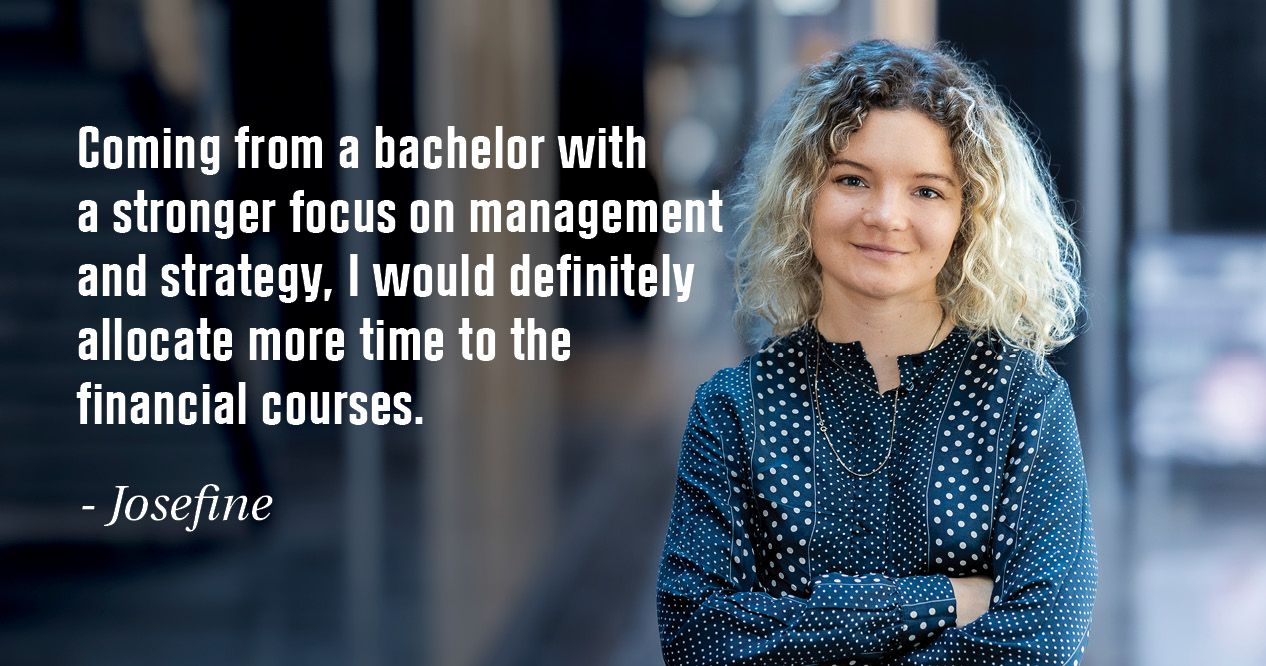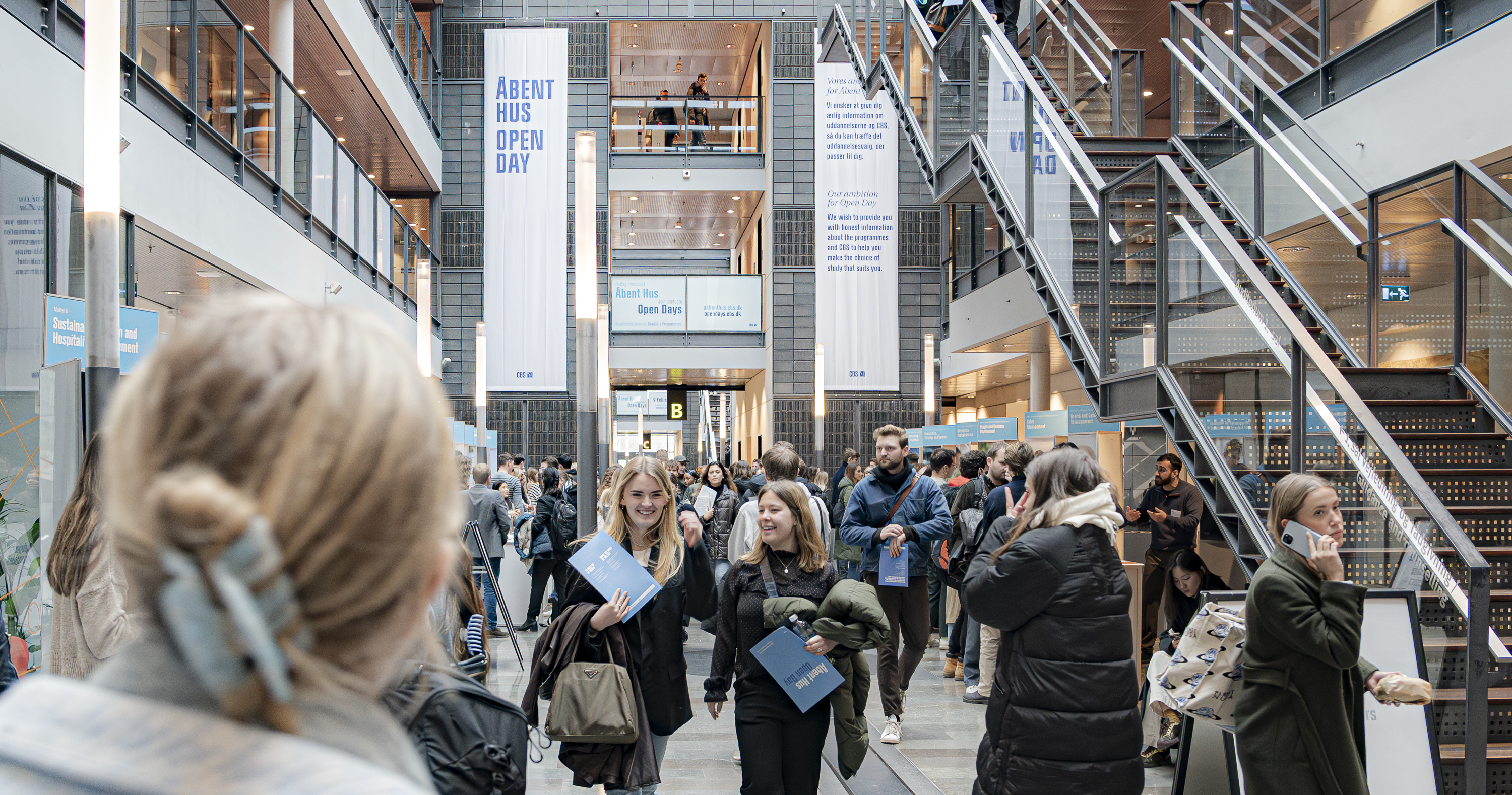During the programme, you have various opportunities to create your own academic profile.
Electives
On the 3rd semester, you can choose to study courses of your specific interest. CBS offers a large number of electives within a wide range of topics. You can also choose to take electives at other Danish universities. The electives you choose have to be relevant for your programme.
See the current selection of CBS electives on Single courses and electives - Master
Minor
On the 3rd semester, you can also choose to study a so-called minor. A minor is a package of electives within a specific academic area. Typically, it consists of 3 courses. By taking a minor, you strengthen your competences within a specific area of interest, and you can use it to qualify for specific jobs or industries.
See the current selection of CBS minors on Minors
Exchange
Many students choose to go on exchange on their 3rd semester; usually at one of CBS’ more than 300 partner universities. When you go on exchange through CBS, you do not have to pay for the teaching at the foreign university (with a few exceptions), and you can bring your SU (student grant).
Find a list of all CBS partner universities here
Academic internship
You can choose to replace some of your electives with a so-called academic internship. The academic internship consists of an internship period at a company, which is then completed with a project report. You can do the internship at a company in Denmark or abroad.
When doing an internship you get the opportunity to relate theory to practice and reflect on the academic training you receive at CBS in a practical setting. Therefore, the project report and work assignments during your internship have to be relevant to your study programme.
CEMS - Master in International Management programme
On FSM you can apply for the CEMS - Master in International Management programme. CEMS MIM is a double degree programme, which gives you the opportunity to add a second degree in international management to your CBS degree. This means that you will get both the MSc degree and the CEMS in International Management degree.
CEMS is a 1-year programme, which you study in combination with your CBS degree in your 3rd and 4th semester. Part of it takes place at one of the other CEMS universities abroad.
Learn more about CEMS / Master in International Management
Master's thesis
Your 2nd year is completed with a master's thesis. You choose the topic you want to write about, which allows you to focus on a specific topic of your interest. Typically, you write your master's thesis with a fellow student.
Different perspectives on management
The financial and strategic courses give two very different perspectives on management and decision-making. This is a strength of the programme, but can also be a challenge, as you have to master both the numerical and economic approach of finance, and the qualitative and more comparative approaches of strategy.
Interest in both finance and strategy
To be a good match for this programme, you should have a strong interest in both finance and strategy, and have the desire and skill to work with the application of the financial models and theories combined with the complexity of strategic thinking.
As far as the financial part of the programme goes, you should be prepared to use your skills in statistics and math from the very beginning of the lectures. This makes it a good idea to be up to speed in these areas before you start.
Mix of theory and application
The curriculum is fairly large and academic. The mix of theory and application requires that you should not only apply theory and perform the necessary calculations, but that you should also be able to understand, discuss and explain the relevance of these financial and strategic theories in various contexts. As such, the programme can be seen as consisting of roughly 40% theory comprehension and discussion, and 60% calculations and applications.
Studying in English
If you do not have a bachelor’s degree taught in English, we recommend that you read more about what to consider before applying for an English taught programme.
Read more about Teaching and literature in English on Teaching and working methods.
The programme has an annual intake of about 150 students and roughly half of these are international students. The international students are a mix of people from the Nordic countries, Europe and other parts of the world.
The students are usually very ambitious. At times this can create an atmosphere of competition, but mostly of cooperation, as the students have a strong passion for finance and are eager to use each other for discussing and understanding different aspects of it.
FSM students are traditionally active both in and outside the classroom - both when it comes to discussions in class and to student events. Building good social relationships among your fellow students is up to you, but students consider participation in the various activities important as it helps build a strong professional network for the future.
Student life at CBS
Studying at CBS is much more than just preparing for and going to classes.
At CBS, there are more than 20,000 students with different backgrounds and nationalities. Teamwork is an essential part of studying at CBS both in classes and in extracurricular activities.
With more than 100 student organisations, you also have plenty of opportunities to engage and connect with students across programmes and classes.
Learn more about the vibrant student life at CBS, the student organisations, and the international environment on Student life
For internationals
If you are an international student, we have gathered a lot of information about what it is like to be an international student at CBS and how you can prepare for life in Denmark.
Read more on For internationals
Teaching
There is a certain degree of progression between the courses in the first year. In particular Corporate Finance and Strategic Management are essential for understanding the founding concepts, and several of the other courses build on knowledge from these two.
Classes are often lectures combined with exercises. For the lectures, the whole cohort is together, but for the exercises the class is usually divided into two or three groups to make better room for questions and discussions.
As with all lectures, student interaction is important, and the quality often depends on the attitude of the students and their willingness to participate. Fortunately, there is a good tradition for this in this programme, and students are encouraged to keep it up as this greatly increases the learning output and overall satisfaction.
Read more on Teaching and working methods
Exams
The programme uses a mix of exam types such as written exams, 24-hour cases and essays.
In the second semester there is also an extended group project, where you go in more depth with a relevant topic and problem.
Read more on Exams at CBS
Time consumption
You should know that it is demanding to study in a graduate programme, and both the curriculum and workload is significantly higher than at bachelor level.
If you are studying on a full-time graduate programme, you should expect spending approximately 37 hours on average on your studies each week. The workload will vary during the year.
The time leading up to assignment submissions and exams can be hectic, and you can easily work more than 40 hours a week in this period. Preparing for oral exams can be especially time consuming, because you have to be able to explain and discuss the covered concepts and theories and learn things by heart.
Read more about Teaching and working methods
Student job
Most programmes are quite flexible in terms of combining studies with a student job. Most students work a maximum of 15 hours a week in order to have sufficient time for their studies.
Studying in Denmark - for internationals
If this is your first time studying in Denmark, you may find teaching and exam formats, the grading scale and the academic calendar very different from what you are used to.
Read about everything you need to know as an international student studying at CBS on For internationals > Academic information
What gets you the job?
This programme will give you a strong understanding of finance, as well as an understanding of the limitations of the financial models. This knowledge can be applied to any job where the ability to raise, allocate and manage finances is central. By adding the strategic perspective on this, you get an advantage when making decisions, as you have a broader perspective that takes both financial and non-financial factors as well as the strategic implications into consideration.
Career opportunities
Many graduates find employment in financial institutions. This could be as an analyst or advisor at a brokerage or investment firm, evaluating market developments or making recommendations on whether to buy or sell a particular investment or security.
Some will also find job opportunities in consulting. As a consultant you can help companies tackle a great variety of problems. You could for instance help a company by making an analysis for market entry, or understand the financial implications of different strategic approaches to company expansion or mergers.
The financial and strategic skills acquired can also lead to jobs in a broad range of other areas. For instance in international organizations like IMF, EU or in the public sector.
Competence profile
In the academic profile you can find more information about the various competences you achieve on the programme:
Competence profile for FSM






